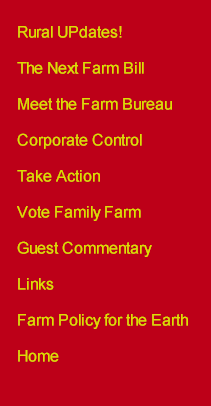|
Help Stop the
Agribusiness Takeover
of Important Conservation Funding.
Help Protect Family
Farmers
From Increased Concentration and Overproduction
Read the Fact Sheet
Below and Contact your Senator today.
Tell them no
handouts for Corporate Agribusiness - Don’t eliminate the NPDES
requirements for EQIP conservation Funds
To find your Senator go to:
http://www.vote-smart.org/index.phtml
The EQIP Livestock Restriction: A
Key to Saving Small Farms and Environmental Quality
The Environmental Quality
Incentives Program (EQIP) was established in the Federal
Agricultural Improvement and Reform Act of 1996 (the 1996 Farm
Bill) "to provide a voluntary conservation program for
farmers and ranchers who face serious threats to soil, water, and
related natural resources" (USDA EQIP Fact Sheet). EQIP
allows agricultural and livestock operators to enroll in 5-to
10-year contracts to manage natural resource concerns. The program
offers financial (cost share and incentive payments) and technical
assistance in the design and installation of practices to improve
water quality, wildlife habitat, wetlands and grazing lands and
other locally-designated natural resource priorities.
Current eligibility requirements for enrollment in EQIP prohibit
the use of cost share funds for construction of animal waste
storage and treatment facilities at large confined animal feeding
operations (CAFOs). The USDA defines "large" CAFOs as
operations containing over 1000 animal units, except where amended
by the NRCS state conservationist. Some groups are lobbying to
remove this restriction and allow CAFOs to use EQIP cost-share
assistance to manage their livestock waste and mitigate the water
and air pollution these operations create. Defenders of Wildlife
believes that the 1000 animal unit restriction should remain in
place for the following reasons:
Taxpayers should not be asked to fund the destruction of family
farms.
Across America, concentration of livestock production into fewer,
larger, industrial operations has been rampant over the past 20
years, driving small producers out of business. For instance, the
number of hog farms has fallen precipitously over the past 20
years, with 443,000 producers going out of business from 1982 to
1997, while the number of hogs stayed the same (Minority Staff of
Agriculture Committee Report, 1997). The huge operations, which
are often affiliated with meat-packing companies, can suppress
commodity prices and drive smaller producers out of business.
Providing subsidies to these mega-producers to clean up their
waste will increase their profitability and their advantage over
smaller producers, hastening the decline of the small livestock
producers.
Large CAFO Operators should be held responsible for cleaning up
after themselves.
One of the ways these large animal feeding operations that have
gained such an edge over small producers is that they have
benefited financially by externalizing to the public the
environmental costs of maintaining large numbers of animals in
confined operations. Current waste-management practices, such as
the giant open-air lagoons, have resulted in millions of gallons
of urine and feces entering streams and groundwater through
leakage, flooding and bursting of lagoons. The air pollution and
stench of the CAFOs has sickened neighboring children, forced
residents indoors and decreased neighborhood property values.
These operators should be held financially responsible for the
cost of properly managing their waste, not rewarded with
government subsidies. The federal government should not be
subsidizing the industry that is creating the pollution.
Taxpayers should not have to fund flawed manure handling
technology.
The most widespread technology used to manage livestock waste,
manure lagoons and sprayfields, are fundamentally flawed. The
lagoons are prone to flooding and leakage, which has resulted in
algal blooms, fish kills, illness outbreaks in humans, groundwater
contamination and lost opportunities for downstream recreation and
water use. Both types of waste facilities emit toxic hydrogen
sulfide, ammonia and methane into the air.
CAFOs can still receive technical assistance and advice under EQIP.
EQIP’s restrictions do not prohibit large operations from
seeking technical assistance for the improvement of their manure
management practices. Defenders of Wildlife believes that giving
advice and assistance to large operators is a fair use of public
funds, but that the actual construction and operation of
management facilities should be paid for by the CAFO operator who
is profiting from the operation, not by the public.
Taxpayer dollars should fund conservation practices above and
beyond the requirements of the law.
Given limited budgets for conservation practices, and the fact
that nearly all agricultural conservation programs are
under-funded and over-subscribed, taxpayer dollars should go to
those operators who are already meeting their legal obligations
and want to take extra measures to enhance natural resources.
Taxpayers should not have to pay to help huge, highly profitable
corporations to quit polluting and obey the law.
In summary, large confined animal feeding operations have forced
hundreds of thousands of small livestock owners out of business.
They have been able to do this in part because they have forced
their associated costs – in air and water pollution – on to
surrounding communities and downstream residents. It is time for
these operators to shoulder the financial burden of handling their
waste in a responsible manner – not to force it onto the
taxpayers at large. Please maintain EQIP restrictions that
prohibit cost-share assistance and incentives to large livestock
operations.
For more information, please contact Aimee Delach at
202-682-9400 x271 or adelach@defenders.org |

